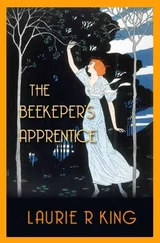J. Janes - Beekeeper
Здесь есть возможность читать онлайн «J. Janes - Beekeeper» весь текст электронной книги совершенно бесплатно (целиком полную версию без сокращений). В некоторых случаях можно слушать аудио, скачать через торрент в формате fb2 и присутствует краткое содержание. Год выпуска: 0101, Издательство: MysteriousPress.com/Open Road, Жанр: Исторический детектив, на английском языке. Описание произведения, (предисловие) а так же отзывы посетителей доступны на портале библиотеки ЛибКат.
- Название:Beekeeper
- Автор:
- Издательство:MysteriousPress.com/Open Road
- Жанр:
- Год:0101
- ISBN:нет данных
- Рейтинг книги:4 / 5. Голосов: 1
-
Избранное:Добавить в избранное
- Отзывы:
-
Ваша оценка:
- 80
- 1
- 2
- 3
- 4
- 5
Beekeeper: краткое содержание, описание и аннотация
Предлагаем к чтению аннотацию, описание, краткое содержание или предисловие (зависит от того, что написал сам автор книги «Beekeeper»). Если вы не нашли необходимую информацию о книге — напишите в комментариях, мы постараемся отыскать её.
Beekeeper — читать онлайн бесплатно полную книгу (весь текст) целиком
Ниже представлен текст книги, разбитый по страницам. Система сохранения места последней прочитанной страницы, позволяет с удобством читать онлайн бесплатно книгу «Beekeeper», без необходимости каждый раз заново искать на чём Вы остановились. Поставьте закладку, и сможете в любой момент перейти на страницу, на которой закончили чтение.
Интервал:
Закладка:
‘This murder …’ began Father Michel, adding a touch of water to the pastis in both of their glasses.
‘My partner and I are not absolutely certain yet that it really was murder, Father. Amaretto isn’t common, even on the marché noir , but it could have come from there. Did our beekeeper buy such things?’
‘Not from around here. Alexandre didn’t even care for the stuff, but what you really mean to ask is, could Madame de Bonnevies have added the poison to it.’
‘I’m waiting, Father.’
‘Then wait. God is still hearing dispositions on the matter. Madame de Bonnevies tried repeatedly to get me to intercede on her son’s behalf. She begged me to find her three skilled workers who would willingly leave their jobs, their families and loved ones, to work in Germany, in return for which, her son would have been released.’
This was the Relève , the exchange programme whose poster, of a male Germanic fist holding an upraised key, was to the right of the priest. But now that scheme, having been introduced in mid-1942 and having failed utterly, had been replaced by the Service du Travail Obligatoire , the forced labour draft, so even posters like that of the radiant young mother telling her four children money was now on the table, were passé. Now all non-essential males born between 1 January 1912 and 31 December 1921 immediately faced being called up.
The priest cleared his throat, then wetted it.
‘I refused, of course, and advised patience. It was wrong of me.’
‘Why so?’ asked the Sûreté.
‘Alexandre might still be alive. It’s a question that haunts me. Madame de Bonnevies has suffered greatly and is a very distraught, very desperate woman who has had two and a half years of agonizing over that son of hers and has, I should surmise, tried everything possible to free him.’
The hands that fingered the glass so delicately were not big, but finely boned. Beneath the jacket, the priest wore a grey cardigan that had lost none of its original buttons yet had probably been purchased back in 1930.
‘The past is food for the present, Inspector, but at its table the future is nourished. If ever there was a woman wronged it was Juliette de Bonnevies. Oh for sure, Alexandre was not only one of my parishioners but also a very dear friend, and I am much saddened by his unfortunate and untimely death. And certainly I tried to intercede in that marriage. Love for his wife — a wife who had borne him the son of another man. Pah! He refused her this just as she refused it him. They tried, of course, at first, but very soon it became apparent both were prisoners of the other; she to dote on her son and ignore the daughter she and Alexandre shared; he to do exactly the reverse.’
‘He lived on her money.’
‘He married her because of it. He knew she was pregnant with the child of another. It had all been arranged. Her family, his family, the matter settled. You see, I married the couple, and when I leave here to walk back up the street, I will see my church’s beautiful and ancient bell tower stained by the mistake I made.’
‘They hated each other.’
‘Of course they did.’
‘And Danielle?’
‘Has always felt she meant nothing to her mother, and everything to her father.’
It would be best to give St-Cyr a moment, and to replenish his pastis. ‘Inspector, that child has no other choice than to peddle merchandise. Alexandre had no head for filling the family larder, even in the good times, except for the produce of his bees. Since the Defeat, the mother has had little head for it either. Those two existed solely because the child they had produced chose to hold them together and feed them.’
It had to be asked. ‘Could Danielle have inadvertently picked up that bottle during one of her trading circuits?’
‘Then why did he choose to drink from it days or perhaps weeks afterwards?’
A good point, but was Father Michel still trying to suggest the mother was guilty?
They finished their second cigarettes in silence. None of the other patrons watched them now. All were huddled in close conversation. But two women had entered the café so quietly, thought St-Cyr, he was troubled by the fact he hadn’t noticed them and the priest hadn’t let on.
Both women were in their mid- to late forties, and one Sûreté glance at them sufficed. Both turned away to look out at the rue Saint-Blaise through curtains that held that same gossamer of tired lace he’d seen as a boy. Lace that cried out in despair for a wash or an airing in the rain but, even so, wore the patina of stains — those largely of tobacco smoke and fly spray — with a frayed dignity.
‘I’ve asked them to come, Inspector. As a man who was denied his conjugal rights, Alexandre made his visits to the house of Madame Thibodeau. A sin, God, I am certain, readily forgave but never would his wife. Never. And the question is, Why did he continue to visit a house so close to home? Was it to humiliate her?’
Both women were hard, time-worn filles de joie well on their way to that charlady-Valhalla of all such types.
‘Though a scientist and Président de la Société Centrale d’Apiculture , Alexandre prided himself on his roots. His father was head clerk in the shop of Juliette de Goncourt’s father on the rue du Faubourg Saint-Honoré. One de was simply exchanged, admittedly, for the dubious respectability of another, and with it eventually went her father’s money.’
‘And the son’s real father?’ asked St-Cyr.
‘She never told anyone, not even that father of hers, though de Goncourt loved his little grandson and did come to the boy’s baptism. I insisted, for her sake, Inspector, as much as for the child’s. In Charonne, as in any village or on any street, for that matter, the women always seem to be able to count better than their menfolk. Six months was all it took, and everyone knew it and that she had come from being far better off than them.’
‘De Goncourt must have been a very stubborn man.’
‘But he loved his Juliette and thought he was doing what was best. Now let me call those two over to our table. They’ll talk more freely if I’m present. Together we’ll find what answers they can give, for I see that you will need help with this murder and that it was not so straightforward and simple as I had at first felt.’
‘Juliette?’
‘And an end to the agony of his refusal to help her free the son for whom he had no love and little use.’
Leather, lead and copper, beeswax and candles, thought Kohler as he sat behind the wheel of the Citroën in the avenue Matignon. Flowers … mein Gott , hothouse roses and a birthday cake. Picnic hampers stuffed with pâté, Brie, caviar and champagne. Beautiful society women and très chic Parisiennes were being accompanied by well-turned-out Wehrmacht NCOs, many of whom were old enough to have fathered them.
There was constant traffic into and out of the former hôtel particulier of Gustav Eiffel. The boys of Das Deutsche Beschaffungsamt sure knew how to do things. Not a stone’s throw from the Rond Point of the Champs-Élysées and the rue du Faubourg Saint-Honoré, the Wehrmacht’s Procurement Office had been here right from the start in June 1940. Specialists in banking and industry, most of the staff had been drafted, of course, or had volunteered their expertise but why not make life enjoyable while you’re away from home?
Vélo-taxis drew up to the entrance of that tidy little mansion whose soft grey stone, Louis Philippe ironwork, tall French windows, and slate-covered, mansard roof, fitted in eloquently with the rest of the street. A Peugeot negotiated one of two arched carriageways. People on the street said hello, the men politely touching the peak of a cap or brim of a freshly blocked fedora.
Читать дальшеИнтервал:
Закладка:
Похожие книги на «Beekeeper»
Представляем Вашему вниманию похожие книги на «Beekeeper» списком для выбора. Мы отобрали схожую по названию и смыслу литературу в надежде предоставить читателям больше вариантов отыскать новые, интересные, ещё непрочитанные произведения.
Обсуждение, отзывы о книге «Beekeeper» и просто собственные мнения читателей. Оставьте ваши комментарии, напишите, что Вы думаете о произведении, его смысле или главных героях. Укажите что конкретно понравилось, а что нет, и почему Вы так считаете.












